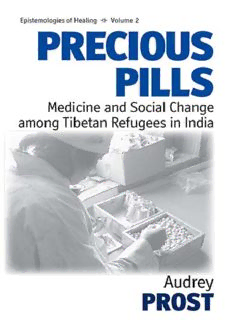
Precious Pills: Medicine and Social Change Among Tibetan Refugees in India PDF
Preview Precious Pills: Medicine and Social Change Among Tibetan Refugees in India
Precious Pills Series: Epistemologies of Healing General Editors:David Parkin and Elisabeth Hsu, Institute of Social and Cultural Anthropology, Oxford This series in medical anthropology will publish monographs and collected essays on indigenous (so-called traditional) medical knowledge and practice, alternative and complementary medicine, and ethnobiological studies that relate to health and illness. The emphasis of the series is on the way indigenous epistemologies inform healing, against a background of comparison with other practices, and in recognition of the fluidity between them. Volume 1 Conjuring Hope: Magic and Healing in Contemporary Russia Galina Lindquist Volume 2 Precious Pills: Medicine and Social Change among Tibetan Refugees in India Audrey Prost (cid:2) Precious Pills Medicine and Social Change among Tibetan Refugees in India Audrey Prost prost.qxd:prost.qxd 7/14/08 10:15 AM Page iv First published in 2008 by Berghahn Books www.berghahnbooks.com © 2008 Audrey Prost All rights reserved. Except for the quotation of short passages for the purposes of criticism and review, no part of this book may be reproduced in any form or by any means, electronic or mechanical, including photocopying, recording, or any information storage and retrieval system now known or to be invented, without written permission of the publisher. Library of Congress Cataloging-in-Publication Data Prost, Audrey, 1977- Precious pills : medicine and social change among Tibetan refugees in India / Audrey Prost. p. cm. -- (Epistemologies of healing ; v. 2) Includes bibliographical references and index. ISBN 978-1-84545-457-9 (hardback : alk. paper) 1. Medical anthropology--India. 2. Medical anthropology--Tibet. 3. Traditional medicine--India. 4. Traditional medicine--Tibet. 5. Tibetans--Medicine--India. 6. Tibetans--India--Social conditions. 7. Refugees--Tibet. 8. Refugees--India. I. Title. GN296.5.I4P76 2008 306.4'610954--dc22 2008014702 British Library Cataloguing in Publication Data A catalogue record for this book is available from the British Library Printed in the United States on acid-free paper. ISBN: 978-1-84545-457-9 (hardback) (cid:2) For my family (cid:2) Contents List of Figures and Tables viii Acknowledgements ix Note on Transliteration and the Wylie System x List of Abbreviations xi Introduction 1 PART I: INEQUALITIES IN EXILE 1. ‘Because we are Tibetans …’: Talking about Health 15 2. ‘India is the Happiest Place!’: Contextualising Exile 30 3. The Pathogenic Nature of Exile 43 4. From ‘Old-timers’to ‘Newcomers’: Social Inequalities in the Diaspora 54 PART II: THE ROLE OF TRADITIONAL TIBETAN MEDICINE 5. The Mentsikhang: Construing Traditional Authority 77 6. Humours on Trial: The Mentsikhang’s Dilemmas 98 Epilogue 127 Glossary 130 Bibliography 143 Index 151 (cid:2) List of Figures and Tables Figures 2.1 Gangkyi’s main square 33 2.2 Young Tibetan newcomers 37 3.1 Tibetan woman selling medicinal substances 50 5.1 His Holiness the Dalai Lama with landmarks from Bodh Gaya 79 5.2 The Lhasa Mentsikhang in 2005 84 6.1 Library of Tibetan Works and Archives (Dharamsala, Himachal Pradesh) 104 6.2 Anatomical drawings 112 Tables 2.1 Medical pluralism in Dharamsala 39 3.1 Disorders considered ‘prevalent’in the exile community 45 3.2 Explanations for prevalent disorders 46 3.3 Medicinal and protective substances 49 (cid:2) Acknowledgements I would like to express my deepest gratitude to the many people who helped me during fieldwork in Dharamsala. Dr Dawa (Mentsikhang), the late Dr Tenzin Choedak, Dr Dickyi Tsomo, and Dr Tseten offered help and insights. For their support and humour, I wish to thank friends Tenzin Lhawang, Jamyang Tenzin, Tsering Tendel, Tenzin Tsultrim, and Lobsang Gyatso at the Library of Tibetan Works and Archives. I am grateful to Norzum and her family for looking after me during the first half of my stay. Humble thanks are also due to Tashi Tsering of the Amnye Machen Institute for his insightful research suggestions, to Sangye Tendar Naga for his teachings, and to Nyima Phuntsok’s family for their kind support. I have not named friends and informants who contributed stories of illness, but my biggest debt is obviously to them. Alexandra Correia, Paula Sharp, Stuart Yeh, Frédéric Geri, Sanna Allsopp, Claire Colomb, Nathalie Rivère de Carles, and Murielle Cozette offered friendship and inspiration. Dr Yoshitaka Ota and Dr Etsuko Ota were generous beyond all expectations. I am also grateful to the various persons who have read and offered suggestions on drafts of this work: my supervisors Dr. Mukulika Banerjee and Prof. Murray Last, Prof. Phil Burnham and Prof. Danny Miller at University College London, Dr. Martin Mills and Dr Martin Potter, as well as to my thesis examiners, Dr. Charles Ramble and Prof. Geoffrey Samuel. Prof. Murray Last provided much inspiration as well as some of the photographs included in this book. I am particularly indebted to Barbara Gerke from Oxford and the International Trust for Traditional Medicine, and to Dr Mona Schrempf at the Humboldt Universität zu Berlin for their invaluable comments and advice. The shortcomings of this work are, however, entirely my own. This book is dedicated to the students of Dharamsala’s Mentsikhang, who serve patients with insight and compassion despite the traumas of exile.
Description: